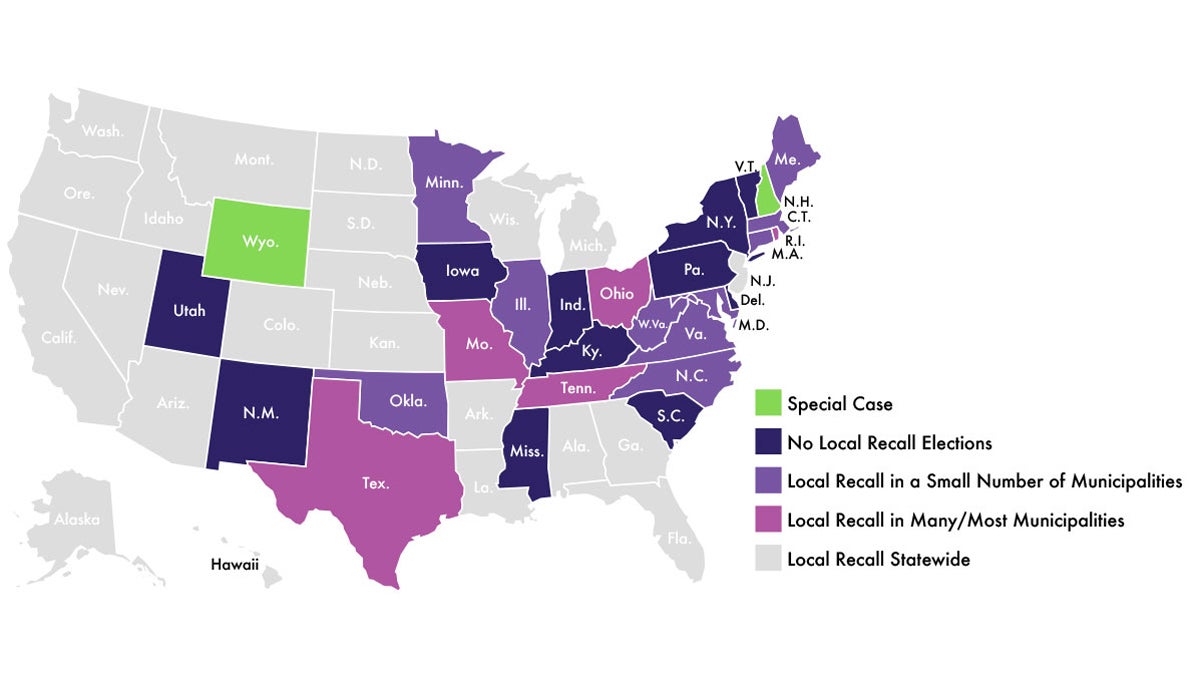Mapping: State laws for recalling or removing local elected officials

Most states allow voter recall of municipal officials in some or all communities. (Graphic by Tom Downing/WITF)
Pennsylvania’s rules for ousting municipal officials are among the most stringent in the country.
The commonwealth doesn’t permit recall elections, nor does it allow local governing bodies to vote out elected officials if, for example, they violate their duties of office.
It’s a rare combination. Only Utah and Mississippi have the same rules. Elsewhere, it’s easier to eject wayward officials. At least in theory.
The question came up recently amid backlash over West York Mayor Charles Wasko’s racist Facebook posts.
Initially, Wasko resisted calls to quit and didn’t show up at a regularly scheduled council meeting. He made a resignation offer, which he attempted to retract after borough council already had accepted it and appointed Coucil President Shawn Mauck to fill the vacancy effective Oct. 21.
In the meantime, residents have learned they had few options to remove Wasko without involving state lawmakers and their impeachment process (which has never actually been invoked for a municipal office holder, experts say).
Keystone Crossroads wondered how it works in other states, so we consulted policies, election officials and municipal law and policy experts from all over the country.
Here’s the breakdown, in detail:
12 states don’t allow local recall elections
Most states without voter recall of municipal officials do have an alternate removal process in place that doesn’t involve the state legislature. For instance, in New Mexico, other local elected officials can petition for removal by a judicial panel; in New York, anyone can file a similar petition. Six states let local governing bodies handle it independently by voting out an official who might, for example, be shirking his or her duties of office: Kentucky (mayors only), Delaware, Vermont and Iowa (if provided in the municipal charter), and Indiana and South Carolina.
New Hampshire’s also on the list, but has conflicting policies. The state statutes provide for local recall, which conflicts with the state Constitution. Although the law hasn’t been amended, officials defer to the constitutionally prescribed process.
Pennsylvania’s municipal codes (i.e., state statues laying out the framework for how different types of local governments operate) provided for recall and removal by local governing body vote until 2014, despite the state Constitution establishing a process in 1968 and multiple court decisions affirming deference to it over the decades since. Even Pennsylvania’s Department of Community & Economic Development listed recall as a potential area of governance home rule municipalities might address well after the courts had settled the question.
21 states allow local recall in certain communities
Any community in Rhode Island, Missouri, West Virginia, Illinois, Maine, Maryland and Oklahoma can have local recall — if the locality’s gone through the process of putting together a charter that includes local recall. About half of the communities in Rhode Island, Missouri and West Virginia have done so. It’s no more than 87 of nearly 600 communities in Oklahoma and relatively few in Illinois, Maryland and Maine.
At least half of the population in Texas lives in a community with local recall; other municipalities without recall have no alternate mechanism for independently removing local officials in the rest of the state.
In North Carolina, 26 municipalities have local recall — elsewhere, there is no mechanism for removal from office without involving the state legislature.
Connecticut’s recall communities are capped at five with a combined population that’s less than 10 percent of the state total.
Wyoming is a special case because only commission governments can have recall — but right now, no municipalities have that type of system in place, according to the state’s municipal league.
17 allow recall elections at the local level, in every municipality
In Virginia, if voters elect to remove a municipal official, courts must approve the decision before it’s effective.
Hawaii’s counties allow local recall; the state doesn’t have any other form of general purpose local government, according to University of Hawaii law professor David Callies.
Sources: Iowa League of Cities, New York Conference of Mayors, Wyoming Association of Municipalities, municipal associations of Maine, Maryland and New Hampshire; Utah, Missouri and Vermont leagues of cities and towns; municipal leagues of Texas, Oklahoma, Ohio, West Virginia and Illinois
Editor’s note: this post has been updated to correct the source of a document and reflect developments in Mayor Charles Wasko’s resignation process.
WHYY is your source for fact-based, in-depth journalism and information. As a nonprofit organization, we rely on financial support from readers like you. Please give today.



